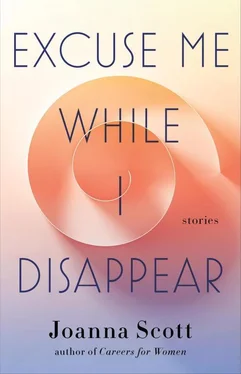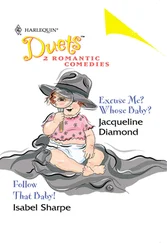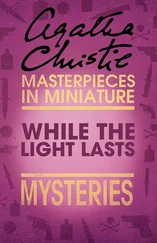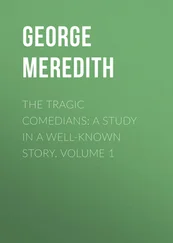I was twenty-five years old and confident that all was going according to plan. I agreed with my peers that we were living in a golden age. The world was at peace. Every question had an answer… until the morning when I was typing the final sentences of chapter two of my dissertation on my laptop, writing the words—
What words? Maybe something close to these words I’m writing now, surely involving dependent clauses, nouns, an article, an adverb, whatever, I’ll never know, because I can’t remember the specific words, only the experience of watching the loop of a b break away from its stem, an o dissolve, an a sink to the bottom of the screen and disappear, replaced by symbols: ⊆Σφℜξω, and on and on in a blur where there had once been sentences.
III.
I was the second student in line at the Question & Information desk on the ground floor of the Knowledge Gallery. While I stood there waiting my turn, I noticed that the letters on the digital sign above the desk had been replaced by a video of cascading roses. Naive as I was, I didn’t connect the roses to the symbols on my laptop screen.
The first student was an undergraduate woman whose PowerPoint had frozen—a coincidental glitch that the techie, himself an undergraduate, managed to repair simply by turning the student’s tablet off and on again.
“Hi,” he said to me. He had a scruff of a beard, icy blue eyes, and a bowl of donut holes next to his Mac. “What’s up?”
I tried to contain my panic. “It looks like I just crashed. All my files—I can’t… I mean, I can access them, but everything has been scrambled.”
“Let’s take a look.”
I opened the laptop and touched the screen to activate the light. The symbols were still there, a wallpaper of shapes that reminded me of snorkeling: sea grass waving, jellyfish drifting, minnows darting away from my submerged hand.
“Cool,” said the techie.
“Can you fix it?” I implored.
“Mmmm.” Still staring at the screen, he reached for the bowl, blindly fumbled for a donut hole, and popped it in his mouth. He chewed in concentrated silence, pressing various keys and studying the screen for the results that didn’t come. While I waited, I reminded myself that a crash was no more than an inconvenience. With every file automatically saved to the Cloud, everything could be recovered. Still, it would take time to restore the files to my hard drive, and more time if I had to buy a new computer entirely.
The Q&I desk was positioned at the rear of the ground floor. It was early, and workstations still had empty chairs. But among the students scattered throughout the Knowledge Gallery, a new kind of sound emanated, a flurry of murmurs and exclamations competing with the rattling of keyboard taps and the burbling of espresso machines.
“Oh just, what, you gotta be kidding!” said a boy loudly from across the room.
“Shit, shit, shit!” cried someone from a cubicle on the second floor.
I heard chairs scrape along the laminated floors. I heard a phone buzz and then a thump I couldn’t identify but sounded like a small bird flying into plate glass. I looked toward the nearest window. The sun was still shining, the magnolia blossoms still dancing in the breeze. At the Q&I desk, the techie tapped my keyboard with impressive speed, then stopped and studied the screen.
“I don’t really understand why they call them holes,” he said at last.
“What?”
“If it were up to me, I’d call them centers.” I realized he was talking about the donut holes only when he offered the bowl to me, inviting me to take one. “I mean, the holes are what they leave behind, not what they are. It’s like saying they’re an absence. Identifying them with the space they once filled.”
I wanted to say something insulting, but the rest of my day depended upon this techie’s ability to recover my files. I needed his know-how, as did the students who were lining up behind me.
“A hole is a hollow space in a solid body.” He tapped the Escape key several times. FaceTime on his Mac rang. “Hang on, will you?” he said to his screen. “On the other hand, there are black holes, defined by such a strong gravitational pull that no matter can escape. They’re interesting, don’t you think?”
The phone in his pocket buzzed. He looked at the number and answered briskly: “Yeah, yeah, get Daryl down here, maybe Inez, too. Looks like a busy day ahead of us.” He clicked off the phone and rested his chin in his hands, studying his own Mac. He poked at the touchscreen, cocked his head to cast a sideways glance at my laptop, then shut his eyes for a long moment, as if giving up the effort to hide his boredom.
“Frankly, I don’t know what’s going on,” he finally admitted.
“What do you mean? You can’t fix it?” I asked.
“You have a Cloud account, right?”
“Yeah, of course.”
“Then you’re safe,” he assured me.
“No she’s not,” said the boy behind me. “The Cloud is saying text files are inaccessible.”
“My life is over,” said a girl wearing cutoff shorts and a vintage Minnie Mouse T-shirt, marching toward us without bothering to take a place in line, her flip-flops angrily slapping the floor. “I give up.”
“You’re cutting,” another girl called from the back of the line.
“Look there—” The boy behind me directed our attention to the television on the wall. The supertitles at the top of the screen were garbled symbols; the bottom strip, where breaking-news headlines usually circulate, was blank. The sound was on mute, but we could see that the newscaster had stopped talking and was looking frantically in the direction of the teleprompter.
“Must be a malware offensive,” said the techie, popping another donut hole into his mouth. “We’ll have to wait for quarantine mandates and the updated firewall. Everyone got the same problem?” More students were arriving in search of help. The line was long and getting longer, with students groaning, complaining, jostling one another, reminding friends about the dance on Friday in the Field House. “Hey, guys,” called the techie to the crowd. “Everyone got a problem with text?” There was agreement, cursing, and laughter in the crowd. The techie interlaced his fingers, cracking his knuckles. “Come back in five,” he said to us. What did that mean? Five minutes? Five hours?
It would take a good five hours for most of us to become aware of the vastness of the attack, and five days or more to understand the extent of the loss: everything written in English, new and old, every book that had been scanned (and, as was protocol back then, discarded), every document in a digital archive, every email and text, everything involving the digital transmission of words, everything that provided our civilization with a record of its vast knowledge was gone, dissolved by a virus that had been lying latent in software from the beginning, programmed fifty years in advance to explode all at once, leaving only shreds of meaningless shapes floating with malicious wantonness on screens of English-speaking users around the world.
Luckily, the important diagrammatic programs that keep the infrastructure running, along with images and videos, were untouched by the attack. I suppose this might explain the current blasé attitude about it all. There’s general consensus that the essential documents have been recovered, some located as rare hard copies, most supplied through translation. The American public has long since stopped fretting over missing materials. But let’s not pretend that we’ve restored the full inventory. Not even close. We can’t begin to know what we’ve lost. All we can do is keep searching, and advocating for funds for the National Archive Project. Where would we be without the NAP?
Читать дальше












